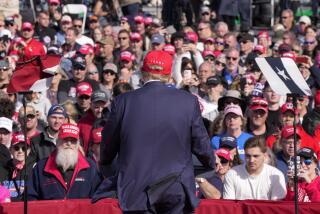‘Birther’ blather lives on
- Share via
President Obama’s decision this week to present a documentary rebuttal to stubborn suspicions that he was not born in the United States — and, therefore, is not a legitimate chief executive — is a sobering reminder that, for a significant number of Americans, their relationship with politics and media has entered an era of eerie uncertainty.
Wild allegations about the president’s birth and parentage have been around since the last general election, but — as The Times reported Thursday — Obama decided to address them directly and to release his long-form birth certificate when he saw that discussion of the economic crisis was being crowded out by commentary on the so-called birther phenomenon.
As a recent CBS News/New York Times poll found, 45% of Republican voters who responded believe that Obama was not born in the United States and holds his office illegally. Overall, the survey found, 1 in 4 American voters believe the president was born abroad and an additional 18% say they aren’t sure. These assertions survived despite repeated reports by virtually every serious news organization in the country that Obama was born in Hawaii.
One of the striking things about the reaction to the president’s calm and — to reasonable minds — entirely persuasive appearance in the White House briefing room Wednesday was the rapidity and ease with which so many leading birthers rejected the evidence he presented.
America has experienced periods of bitter partisan division in the past, but in the current era it often isn’t the interpretation of our national life that’s in dispute but the actual facts of our common existence. That’s as significant a rejection of the serious news media as it is of opposing political figures.
Until very recently, if every professional news organization in the nation examined a charge and found it baseless, it was — for all intents and purposes — dropped. Today, the growth of the Internet has drained the noun “news” of its former authority. If you don’t like the facts presented on the sites of established news organizations, you simply keep clicking until you find one whose “facts” accord with your beliefs.
“There are no more arbiters of truth,” former White House Press Secretary Robert Gibbs told the Politico website. “So whatever you can prove factually, somebody else can find something else and point to it with enough ferocity to get people to believe it. We’ve crossed some Rubicon into the unknown.”
Like so many of the genuinely disjunctive moments in American history, this Rubicon flows with both old and new currents.
The new, of course, is the way in which the alternate realities of the Internet’s fringes and brutally partisan talk radio empower the political culture of assertion and denial to which the birthers belong. It’s a characteristic they share with a significant slice of the “tea party” movement, which advances not just its own version of contemporary America but a willed, faith-based version of our history as well.
In this propensity for applying the intellectual mechanisms of fundamentalism and faith to politics, the birthers also represent an American tendency that stretches back to the early 19th century. It was, in important ways, an era rather like our own, characterized by dislocating economic change and democratizing advances in media technology.
In the 1830s, an Upstate New York farmer turned biblical exegete named William Miller used a personal mathematical formula to predict that the second coming would occur in 1843. By all accounts, Miller wasn’t much of a speaker himself, but one of his Boston followers had one of the new high-speed printing presses that were creating America’s first truly popular media. Soon, Miller’s followers are thought to have numbered in the hundreds of thousands.
What’s significant is that, when 1843 came and went without an apocalypse, they simply recalculated and reformulated and kept on believing — setting a standard for a certain kind of cultic American group-think that has recurred in our national life ever since.
We saw an example of that this week, when the birthers’ spokespeople quickly pivoted and insisted that the president was not a citizen because his father was a Kenyan immigrant. There is no constitutional or legal support in any serious quarter for such a view, but that doesn’t seem to matter to the invincibly convinced.
A political climate in which people shout at each other presents one set of problems; one in which people simply talk past each other in mutually unintelligible languages is something new and alarming.
More to Read
A cure for the common opinion
Get thought-provoking perspectives with our weekly newsletter.
You may occasionally receive promotional content from the Los Angeles Times.









